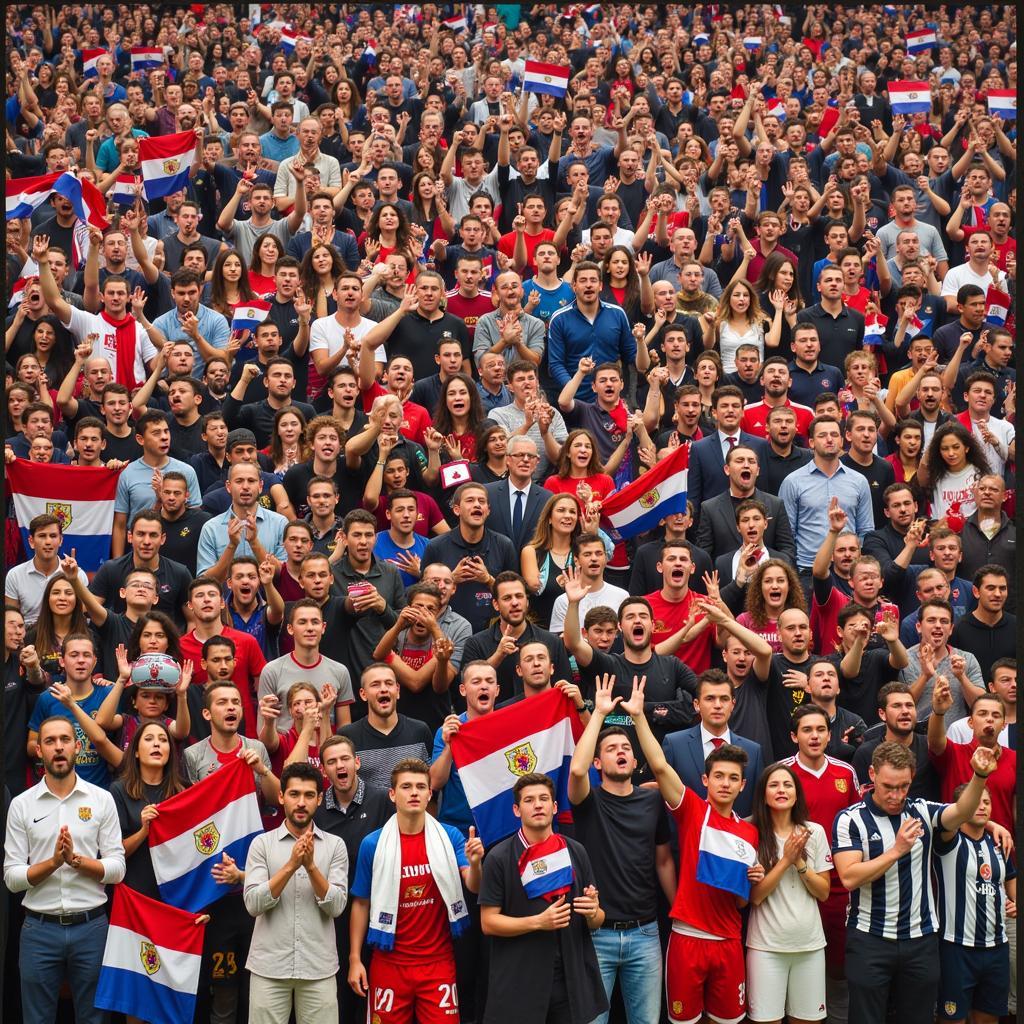Fan chanting is a powerful expression of collective identity and passion, deeply ingrained in the culture of sports, especially football. From the roar of a stadium filled with tens of thousands to the rhythmic clapping of a small group, these vocal expressions create an electrifying atmosphere, influencing both the players on the field and the overall experience of the game. This article delves into the multifaceted world of fan chanting, exploring its origins, psychological impact, and cultural significance.
The Psychology Behind Fan Chanting
Why do fans chant? What drives them to participate in this collective act? The answer lies in the complex interplay of social psychology and the inherent human need for belonging. Chanting provides a sense of unity and shared identity, connecting individuals through a common purpose – supporting their team. This shared experience creates a feeling of camaraderie and amplifies the emotional intensity of the game.
The Impact of Chanting on Players
Studies have shown that fan chanting can have a significant impact on player performance. The roar of the crowd can boost morale and provide an extra surge of adrenaline, pushing players to perform at their peak. Conversely, negative chants directed at the opposing team can create a hostile environment, potentially impacting their focus and performance. Think of it as a form of non-verbal communication, a powerful message sent from the stands to the pitch.
Cultural Significance of Fan Chants
Fan chants are often deeply rooted in local culture, reflecting the history, traditions, and values of a particular region or fan base. They can be simple, repetitive phrases or complex songs with intricate lyrics, passed down through generations of fans.  Cultural Impact of Fan Chants Some chants are humorous, others are aggressive, and some are simply expressions of pure joy and support. This rich tapestry of vocal expressions adds another layer of depth and complexity to the beautiful game. Do you remember a particularly impactful chant? Chances are it’s connected to a memorable moment or a strong emotional experience. You can read more about fan experiences on what is fan fic.
Cultural Impact of Fan Chants Some chants are humorous, others are aggressive, and some are simply expressions of pure joy and support. This rich tapestry of vocal expressions adds another layer of depth and complexity to the beautiful game. Do you remember a particularly impactful chant? Chances are it’s connected to a memorable moment or a strong emotional experience. You can read more about fan experiences on what is fan fic.
Evolution of Fan Chants
Fan chanting has evolved over time, influenced by various factors, including popular music, social and political events, and even rivalries between fan groups. New chants are constantly being created, while older ones are adapted and reinterpreted, ensuring that the tradition remains dynamic and relevant.
The Dark Side of Fan Chanting
While fan chanting can be a positive and exhilarating experience, it can also have a negative side. Offensive or discriminatory chants can create a hostile and intimidating atmosphere, marring the enjoyment of the game for other fans. Addressing this issue is crucial for ensuring that football stadiums remain inclusive and welcoming spaces for all. For a discussion on fan behavior, you might be interested in fan biến thái và thần tượng me đọc truyện. You can also explore doc truyen conan hackviet 9 fan for a different perspective.
Conclusion
Fan chanting is an integral part of the football experience, contributing to the atmosphere, excitement, and cultural richness of the game. While there are challenges associated with negative chanting, the positive impact of this collective expression of passion cannot be denied. By understanding the psychology, cultural significance, and evolution of fan chanting, we can gain a deeper appreciation for its role in the beautiful game. Let’s work together to ensure that fan chanting remains a positive and inclusive force in football. For those interested in Vietnamese football fans, check out hoi fan girl bong da viet nam. More information on specific cases can be found at các case có hub fan.
FAQ
- What is the purpose of fan chanting? To create a sense of unity, support the team, and influence the game’s atmosphere.
- How does chanting affect players? It can boost morale and performance or create a hostile environment for opponents.
- Are all fan chants positive? No, some chants can be offensive or discriminatory.
- How have fan chants evolved? They have been influenced by music, social events, and rivalries.
- What can be done about negative chanting? Education, awareness campaigns, and stadium regulations can help address the issue.
- Where can I learn more about Vietnamese football fans? You can find more information on hoi fan girl bong da viet nam.
- Are there specific cases of fan behavior discussed online? Yes, you can find more details at các case có hub fan.
When you need support please contact Phone Number: 0903426737, Email: fansbongda@gmail.com Or visit the address: Lot 9, Area 6, Gieng Day Ward, Ha Long City, Gieng Day, Ha Long, Quang Ninh, Vietnam. We have a 24/7 customer service team.


